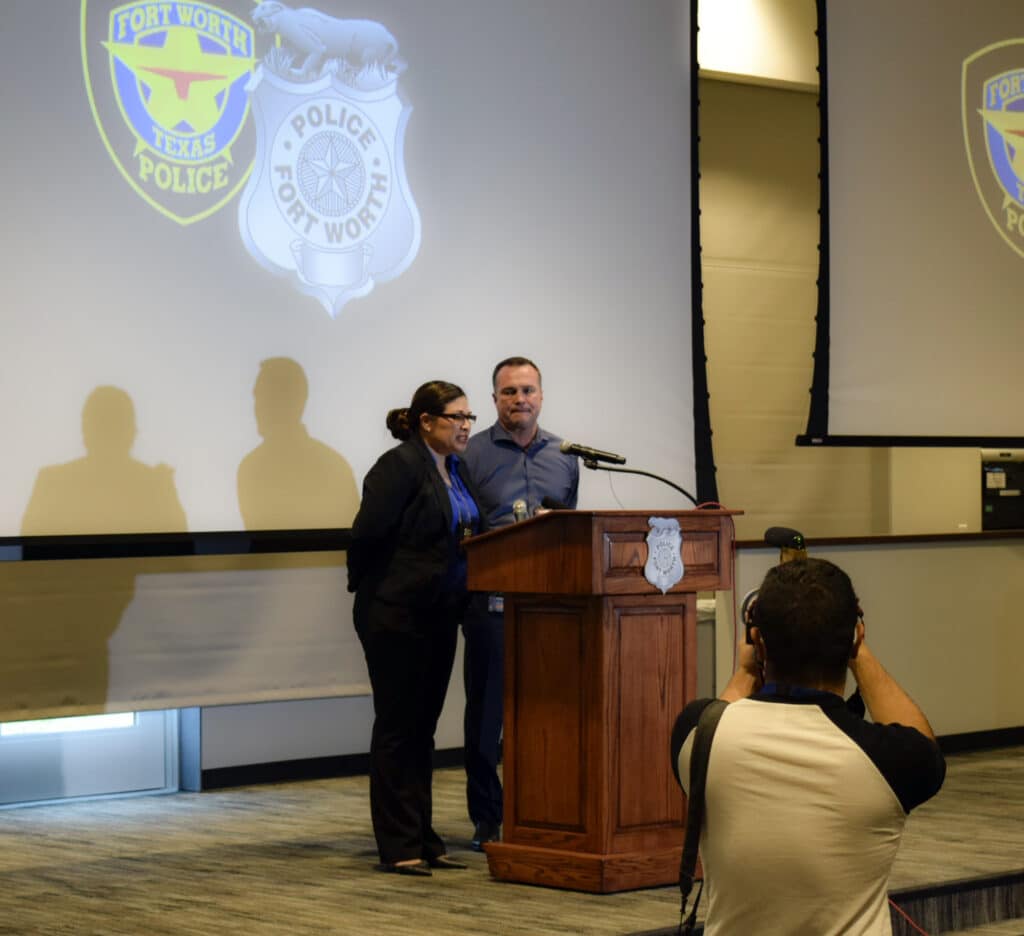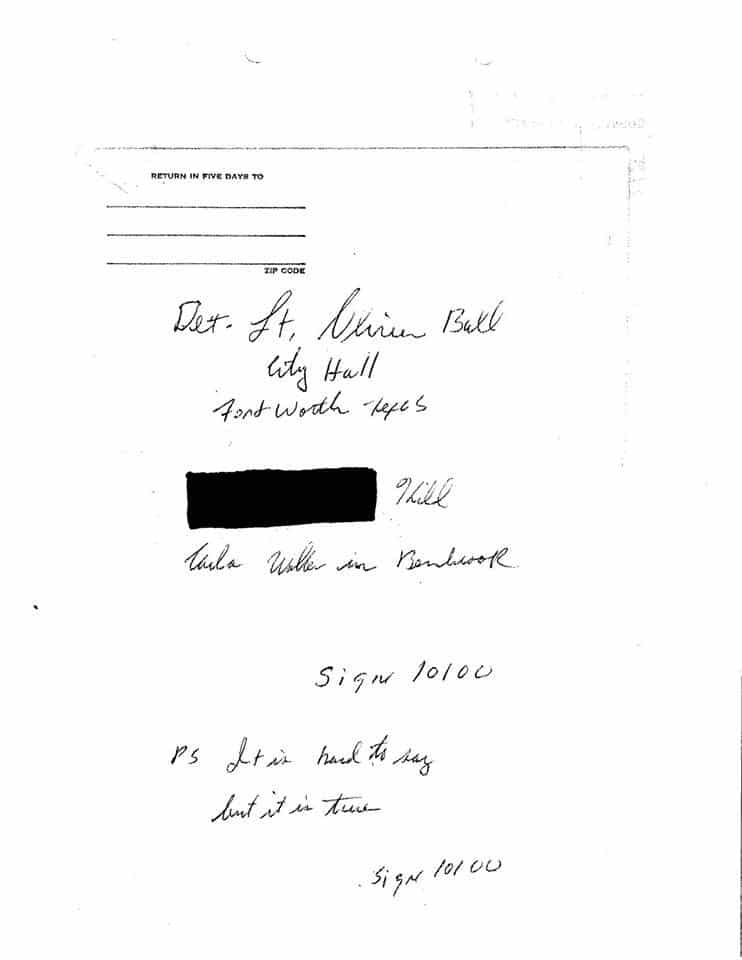One of Fort Worth’s most mysterious murders has apparently been solved.
A man was arrested and charged in the 1974 killing of a Texas teenage girl after nearly 50 years of investigation and the advancement of DNA technology, police said Tuesday.
Glen McCurley, 77, of Fort Worth, was arrested early Monday and charged with capital murder in the abduction, torture, rape and slaying of 17-year-old Carla Walker. He is confined to the Tarrant County Jail with bond set at $100,000.
Online records do not list an attorney for McCurley.
According to an arrest affidavit, McCurley is a man who had been interviewed by detectives at the time of the crime because he owned a gun suspected of being used in the crime, a .22 Ruger. A Ruger magazine was found at the crime scene. It was thought the magazine was released from the gun when the suspect struggled with Rodney McCoy, Carla Walker’s boyfriend.

When McCurley was interviewed by detectives investigating the murder in 1974, he told them that his Ruger had been stolen and that he didn’t report it because he was an ex-con who had been in jail for car theft. Detectives did not pursue McCurley after that interview. He was not looked at in the case again until DNA matches turned the spotlight back on the longtime Fort Worth resident and truck driver.
Here’s the summary of the case:
Just after midnight on Feb. 17, 1974, 17-year-old Carla Walker, a student at Western Hills High School, was abducted from the passenger side of her boyfriend’s car in the parking lot at the Ridglea Bowl on the Benbrook Traffic Circle. The site was most recently the Cendera Center. The boyfriend fought with the perpetrator but was wounded and lay unconscious for a period of time. Three days later Walker’s body was found in a culvert just off the road near Benbrook Lake.
Much like the arrest of the suspect in the Golden State Killer case in California, familial DNA evidence was used to crack the case.
According to the affidavit, Detectives Leah Wagner and Jay Bennett began working on the case in February 2019. They sent evidence and Walker’s clothing out for DNA testing to Othram, a private lab in The Woodlands, north of Houston. Using a new process, a full DNA profile was obtained, and the information was entered into CODIS, a national criminal DNA database. No matches were obtained.
The detectives also entered the information into GEDMATCH, a genealogical database. The company narrowed the list of possible matches to McCurley and his two brothers.
They then obtained DNA from him and he was identified as the suspect.
On July 7, 2020, according to the affidavit, investigators collected trash from a bin at McCurley’s residence and some items were sent for analysis. On Sept. 4, they learned an item found in the trash matched the male DNA profile from Walker’s clothing.
On Sept. 10, police returned to McCurley’s home and spoke to him and his wife. McCurley repeated what he told detectives in 1974, saying the gun he owned had been stolen and that his wife was out of town at the time. He also said he didn’t kill anyone and didn’t know Carla Walker. He did agree to provide a DNA sample.
On Sept. 16, that sample came back as a match to DNA found on Walker’s brassiere, according to the affidavit.
A warrant for capital murder was obtained and McCurley was taken into custody without incident.
During a news conference, the two detectives said it appeared that the assault and murder of Carla Walker was random and that McCurley did not know the high school student. The detectives said McCurley, who had previously been in trouble with the law for car theft, has lived a normal life and was married and had two children.
“We had made a promise to the Walker family to do our best, said Wagner.
She said they experienced a mix of emotions as they realized they were solving the high-profile cold case.
“Wow, it’s one thing to work toward a goal and it’s another to achieve it and this was a huge goal. It was a big win for us and the Walker family. We’re just ecstatic that we could finally come to a head after all this time,” she said.
The detectives said the “ah-ha” moment came when they received confirmation of the DNA match on Sept. 4.
“We didn’t want to jump the gun,” said Wagner. “We wanted to be sure.”
“We had taken his case as far as they could with current technology and what evidence we had at the time,” Bennett said.
Wagner said that only when DNA technology advanced to the point where a complete genetic profile could be developed from evidence gleaned from the girl’s brassiere could a solid link be made.
Jim Walker, Carla Walker’s younger brother, thanked investigators with the Fort Worth Police Department for never forgetting about the case or his sister.
Walker admitted there were some dark times over the past 46 years as he waited for answers.
“The word that came across my brain was ‘finally,’ after 46 years, five months and three days, we have a name, a face and are working toward a complete resolution,” he said.
The case has heated up in recent years. In April 2018, Fort Worth police released a letter they hoped might lead to a solution in the case

Walker letter
The crudely written letter is addressed to Detective Lt. Oliver Ball. After some blacked out material, the letter says “killd [sic] Carla Walker in Benbrook.” At the bottom, the letter says “P.S. It is hard to say but it is true.” Officials said the letter was not a factor in finding the current suspect.
The case has also been the subject of a local true crime podcast, which devoted several episodes to the crime, and was recently featured on an episode of the Oxygen network’s The DNA of Murder with former investigator Paul Holes. Holes was heavily involved in solving the Golden State Killer case.
This story includes material from the Associated Press.









